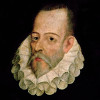“ Men famous for their genius, great poets, illustrious historians, are always, or most commonly, envied by those who take a particular delight and pleasure in criticising the writings of others, without having produced any of their own. ”
Miguel de Cervantes, Don Quixote (1605). copy citation
| Author | Miguel de Cervantes |
|---|---|
| Source | Don Quixote |
| Topic | genius pleasure |
| Date | 1605 |
| Language | English |
| Reference | |
| Note | Translated by John Ormsby |
| Weblink | http://www.gutenberg.org/files/996/996-h/996-h.htm |
Context
“"but it often happens that those who have acquired and attained a well-deserved reputation by their writings, lose it entirely, or damage it in some degree, when they give them to the press." "The reason of that," said Samson, "is, that as printed works are examined leisurely, their faults are easily seen; and the greater the fame of the writer, the more closely are they scrutinised. Men famous for their genius, great poets, illustrious historians, are always, or most commonly, envied by those who take a particular delight and pleasure in criticising the writings of others, without having produced any of their own." "That is no wonder," said Don Quixote; "for there are many divines who are no good for the pulpit, but excellent in detecting the defects or excesses of those who preach." "All that is true, Senor Don Quixote,"”
source


